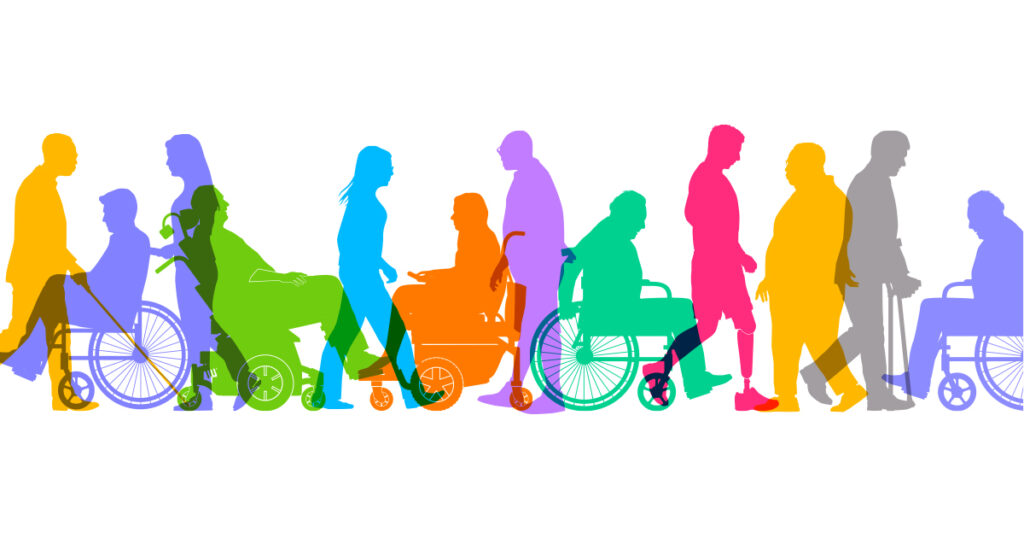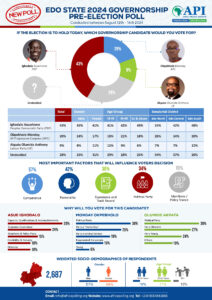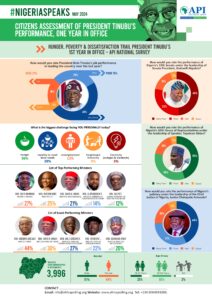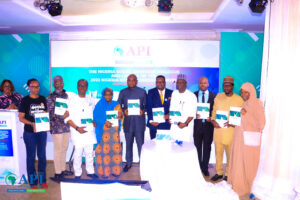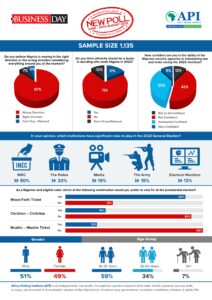Abuja, Nigeria, September 22, 2022 – Africa Polling Institute (API) with support from Ford Foundation organized a launch of the study reports in the first year of the Nigeria Disability Research Project (NDRP). In 2021, Ford Foundation awarded a two-year grant to Africa Polling Institute to conduct research and generate data on persons with disabilities in Nigeria; and to monitor progress on the domestication of “The Discrimination against Persons with Disabilities (Prohibition), Act, 2018” in the 36 states of the federation and the Federal Capital Territory (FCT). The overall objectives of the project are: to engender compliance of public institutions with disability laws and policies that expressly seek to ensure equal access of all Nigerians to public buildings through the availability of ramps, escalators, lifts, etc.; ensure state governments adopt evidence-informed policies that address the challenges of persons with disabilities (PWDs); to advance a better understanding of the challenges of women with disability, particularly as it relates to gender-based violence; and lastly to help build the capacity of research officers of organization of persons with disabilities (OPDs).
A total of three (3) study reports and a disability inclusion assessment & diagnostic tool were launched in the first year of the Nigeria Disability Research Project. The study reports include – Action Research on the domestication of the discrimination against persons with disabilities (Prohibition) Act, 2018; Sexual and gender based violence among persons with disabilities in Nigeria; and National disability data in Nigeria.
Key Findings
Action Research study on the domestication of the discrimination against persons with disabilities (Prohibition) Act, 2018
In summary, key findings from the Action Research study revealed that overall, the Nigerian government has not given a great deal of attention to alleviating the plights of persons with disabilities; as they continued to struggle with myriads of challenges. For instance, despite awareness of the Act by the majority of the respondents, the Act is yet to be fully domesticated across the geopolitical zones. This finding suggests that the welfare of persons with disabilities has not been given utmost priority by the state government across the six geopolitical zones in the country. More so, respondents highlighted: the lack of funds and lack of willingness on the part of state governors and state house of assembly members as barriers hindering the domestication of the Act across the geopolitical zones.
Sexual and gender-based violence among persons with disabilities in Nigeria
The study on sexual and gender-based violence among persons with disabilities in Nigeria revealed that overall, (64%) of the respondents surveyed affirmed that women with disabilities are more vulnerable to sexual abuse than women without disabilities irrespective of age categories and educational levels. The proportion of respondents who agreed with this statement is more in South-South (71%), South-West (70%) and South-East (69%). On physical violence and abuse, findings show that 7 in 10 persons with disabilities surveyed (70%) opined that women with disabilities suffer some form of physical violence compared to men with disabilities. Also, 47% of respondents affirmed that persons with hunchback are more susceptible to ritual killings across all geopolitical zones. This finding cuts across age categories and educational levels. It is interesting to note that the proportion of persons with disabilities who have experienced sexual abuse in their lifetime varied significantly by gender. 28% females compared to males (11%). More so, more respondents in North-East (36%) than in other
geopolitical zones had been sexually abused in the past. Lastly, persons with disabilities highlighted strangers (57%), and immediate family members/relatives/friends (11%) as leading perpetrators of sexual and gender based violence on PWDs.
National disability data in Nigeria
Key findings on National disability data in Nigeria report revealed that in terms of employment, persons with disabilities mostly seek help in locating appropriate jobs (32%), particularly from respondents in South-South (44%) and North West (33%) zones. Also, PWDs seek help in furthering their education/training/skills (23%), particularly in the South-South (29%) and South-West (28%) zones. 15% of PWDs seek availability of assistive technology particularly in the South-South (19%) followed by North Central (16%) and South West (15%).
Regarding access to assistive technology, more than 8 in 10 of PWDs who have some difficulty in seeing cannot afford to get medical glasses and at least 9 in 10 of PWDs cannot afford a hearing aid and walking or climbing equipment/assistance respectively. Regarding accommodation, persons with disabilities with accommodation ownership were more among rural residents (82%) than urban residents (52%). Regarding accommodation suitability, 44% live in unsuitable accommodation, particularly the South-South (50%), North-Central (49%), and North-East (47%) residents. Furthermore, regarding psychological abuse, at least 6 in 10 PWDs experience psychological problems particularly sexual and gender-based violence (89%), violence (83%), abuse (79%), neglect (74%) and discrimination (70%). Lastly, the data show that PWDs are marginally excluded from society as 52% of PWDs surveyed revealed that they do not have access to public institutions, another 43% indicated that they do not participate in political activities and more than 3 in 10 do not participate in sporting activities.
The disability inclusion assessment and diagnostic tool
With support from Ford Foundation, Africa Polling Institute (API) in collaboration with the National Commission for Persons with Disabilities (NCPWD) produced the disability inclusion and diagnostic tool for institutions in Nigeria to help track the progress made on inclusion across both private and public organizations in Nigeria. The tool offers a starting point for those wishing to deepen their understanding and application of disability inclusion across the scope of their work and organization. In addition, it aims to provide guidance, clarity, a practical framework and tools needed for basic universal and accessibility principles embedded within an organization.
Africa Polling Institute (API) is an independent, non-profit and non-partisan opinion research think-tank, which conducts opinion polls, surveys, social research, and evaluation studies at the intersection of democracy, governance, economic conditions, markets, and public life; to support better public policy, practice, and advocacy in sub-Saharan Africa.
Signed
Professor Bell Ihua
Executive Director, Africa Polling Institute
